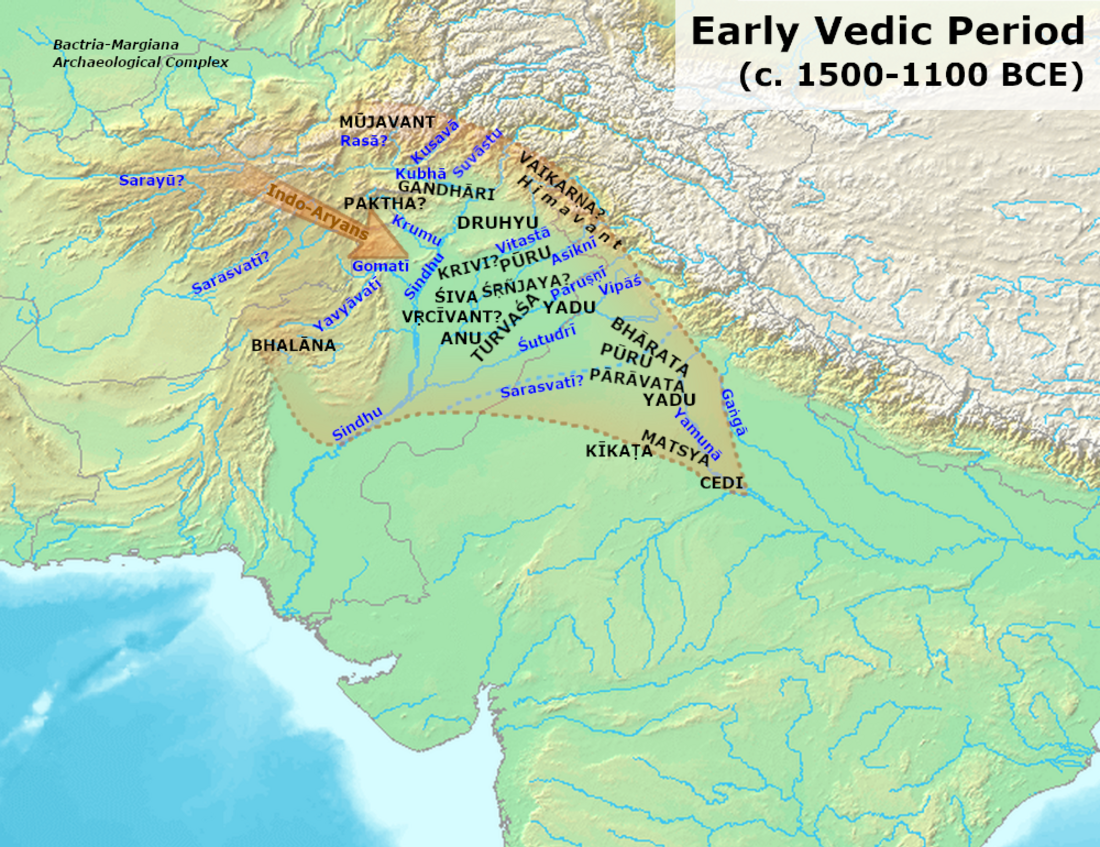Top Qs
Timeline
Chat
Perspective
Kikata
Ancient Indian kingdom From Wikipedia, the free encyclopedia
Remove ads
The Kīkaṭa kingdom, mentioned in the Vedas, is an ancient Indian kingdom whose precise geographical location remains a subject of scholarly debate. While some scholars associate it with the Magadha region in present-day Bihar, because Kikata is used as synonym for Magadha in the later texts;[1] while others suggest a more western location, possibly in the vicinity of Kurukshetra (see below).
This article has multiple issues. Please help improve it or discuss these issues on the talk page. (Learn how and when to remove these messages)
|
The Rigveda references the Kīkaṭas as a non-Vedic people, descendants of ikshuvaku, and of non-Aryan origin, living on the eastern side to Vedic India, who did not practice Vedas, and worshipped rishabhadeva.[2] Scholars like Zimmer have argued in referring to ikshu, that they were a non-Aryan people. According to Weber, they were a descendants of Pre-Vedic Aryan people and were sometimes in conflict with other Vedic people.[3]
Remove ads
Location
While some scholars associate the Kīkaṭa kingdom with the Magadha region in Bihar, others propose alternative locations based on textual evidence and geographical analysis. Mithila Sharan Pandey suggests a location near Western Uttar Pradesh,[4] while O.P. Bharadwaj places them near the Sarasvati River.[5] Historian Ram Sharan Sharma believes they were likely situated in Haryana,[6] and Michael Witzel proposes a location south of Kurukshetra, possibly in Eastern Rajasthan or Western Madhya Pradesh. Witzel's argument is further supported by the observation that the Magadha region is not explicitly mentioned in the Rigveda.[2]
Remove ads
References in texts
Summarize
Perspective
The names, Kitava and Kitika, closely resemble Kikata, and were found in the Mahabharata.
The Ajas, the Prishnis, the Sikatas, the Arunas, and the Kitavas, have all gone to heaven through the merit of Vedic study (12:26).
The Abhishahas, the Surasenas, the Sivis, and the Vasatis, the Ṡalvas, the Matsyas, the Amvashtas, the Trigartas, and the Kekayas, the Sauviras, the Kitavas, and the dwellers of the Eastern, Western, and the Northern countries,--these twelve brave races were resolved to fight reckless of the lives for Bhishma(6:18). The Sauviras, the Kitavas, the Easterners, the Westerners, the Northerners, the Malavas, the Abhishahas, the Surasenas, the Sivis, and the Vasatis were mentioned as taking part in Kurukshetra War siding with the Kauravas (6:107). The Sauviras, the Kitavas, the Easterners, the Westerners, the Northerners, the Malavas, the Abhishahas, the Surasenas, the Sivis, the Vasatis, the Salwas, the Sayas, the Trigartas, the Amvashthas, and the Kaikeyas were again mentioned on the Kaurava side at (6:120).
The tribes Vairamas, Paradas, Tungas, with the Kitavas who lived upon crops that depended on water from the sky or of the river and also they who were born in regions on the sea-shore, in woodlands, or countries on the other side of the ocean waited at the gate, being refused permission to enter, with goats and kine and asses and camels and vegetable, honey and blankets and jewels and gems of various kinds. -- bringing tribute to Pandava king Yudhishthira (2:50).
Madraka, and Karnaveshta, Siddhartha, and also Kitaka; Suvira, and Suvahu, and Mahavira, and also Valhika, Kratha, Vichitra, Suratha, and the handsome king Nila were mentioned as kings at (1:67).
Kikata (कीकट) is mentioned in Mahabharata (VIII.30.45).[7]...."The Karasakaras, the Mahishakas, the Kalingas, the Kikatas, the Atavis, the Karkotakas, the Virakas, and other peoples of no religion, one should always avoid."
Like Rigveda attributes of Kikatas, Atharvaveda also speaks about south eastern tribes like Magadhas and Angas as hostile tribe who lived on the borders of Brahmanical India.[8] According to Puranic literature Kikata is placed near Gaya. It is described as extending from Caran-adri to Gridharakuta (vulture peak), Rajgir.
Remove ads
List of rulers
Known notable rulers were:
- King Kitaka
- Pramangada
- Suvira
- Suvahu
- Mahavira
- Valhika
- Kratha
- Vichitra
- Suratha
- Nila
- Madraka
- Karnaveshta
- Siddhartha
See also
References
Wikiwand - on
Seamless Wikipedia browsing. On steroids.
Remove ads

